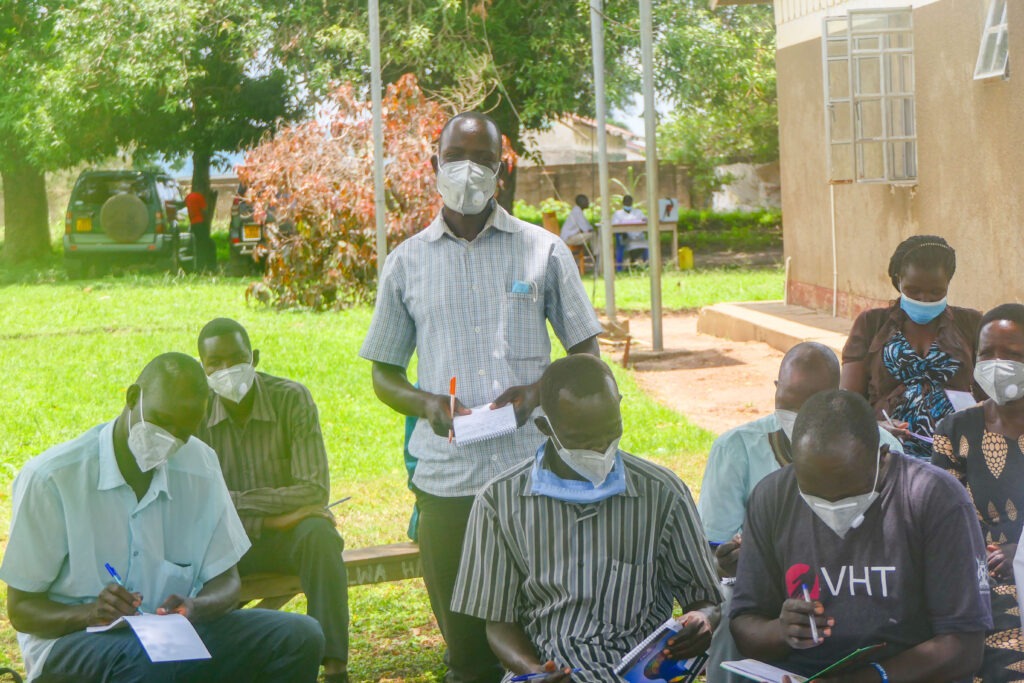Using Locally-Led interventions to Improve Uptake of Measles Vaccination for Children Under 12 Months in Uganda
By Joyce Draru, WI-HER Gender and Youth Advisor; and Harriet Komujuni, WI-HER Senior Gender and Youth Advisor

In Uganda, 4.1% of the deaths among children under five in 2019 were due to measles, three times the global rate, according to UNICEF. In the Kaberamaido district in Western Uganda, a review of government data showed that less than half (42%) of children received the measles vaccine at Alwa Health Center III in April 2021. To address this challenge, our iDARE ™ methodology was applied to address barriers and improve measles vaccination uptake. iDARE (identify, design, apply/assess, record, and expand) is based on the science of improvement and can be applied in various ways, including improving service delivery.
Activity Overview: Improve Uptake of Measles Vaccination
WI-HER oriented district health teams, regional implementing partners, and health workers on WI-HER’s iDARE methodology, supporting them in identifying and orienting selected community influencers. These community influencers—such as religious leaders, village health team members, and local leaders—joined iDARE teams and applied locally-led interventions aimed at promoting health-seeking behavior among women and children to improve measles coverage. The community influencers then conducted community dialogues with mothers of children under 12 months to understand the barriers impacting women from vaccinating their children.
These barriers included:
1) Lack of knowledge around the importance of vaccinations;
2) Lack of spousal support from husbands and partners to support women in vaccination;
3) Myths and misconceptions, such as the vaccines were ungodly (from the satanic world) and were unsafe for children; and,
4) Limited accessibility to vaccination services at health facilities or community outreach posts.
iDARE interventions
In response to the identified barriers, the iDARE team engaged health facility staff, mothers, and caretakers of children under 12 months to design and apply potential solutions. These solutions included:
1) Alwa HC iii expanded their outreach with integrated immunization programming (for example, with family planning);
2) Targeted community mobilizations organized by the community influencers to identify and refer children and their caregivers;
3) Home visits by community influencers to follow up with children who missed their scheduled immunization days; and,
4) Health education to parents and caregivers to discuss the benefits of measles vaccination, and address the myths and misconceptions around the measles vaccines.
The influencers also mobilized and sensitized communities using megaphones in public spaces, like bars, churches, and trading centers. These interventions were routinely monitored and documented to evaluate their success over a six-month period. WI-HER also conducted on-site mentorship visits to follow up on the progress of these activities.
Results of the iDARE interventions to increase measles vaccinations
The team steadily increased the percentage of children who received measles vaccination from 42% in April 2021 to 88% by the end of September 2021. One health worker praised the engagement of community influencers, stating, “We no longer run after mothers to bring their children for immunization. We need community gatekeepers to fight disease and promote good health.”
Conclusion
The engagement of community influencers is vital to addressing and curtailing deep-rooted beliefs and misinformation about vaccines. By addressing these underlying root causes, community members become agents of change who design and implement solutions that result in children accessing the critical and lifesaving care they need.